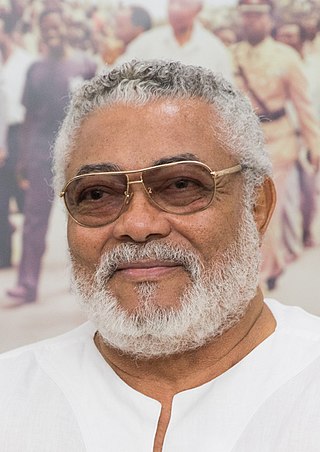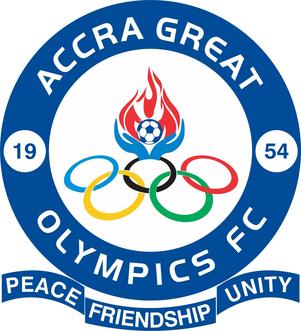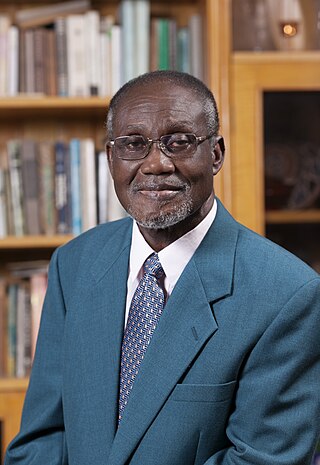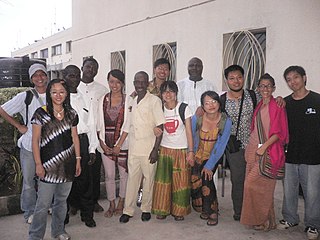Related Research Articles

Ghana, officially the Republic of Ghana, is a country in West Africa. It lies adjacent to the Gulf of Guinea and the Atlantic Ocean to the south, sharing a border with Ivory Coast in the west, Burkina Faso in the north, and Togo in the east. Ghana covers an area of 239,567 km2 (92,497 sq mi), spanning diverse ecologies, from coastal savannas to tropical rainforests. With nearly 35 million inhabitants, Ghana is the second-most populous country in West Africa. The capital and largest city is Accra; other significant cities include Kumasi, Tamale, and Sekondi-Takoradi. In 1957 Ghana became the first colony in Sub-Saharan Africa to achieve sovereignty, under the leadership of Kwame Nkrumah.

The area of the Republic of Ghana became known in Europe and Arabia as the Ghana Empire after the title of its Emperor, the Ghana. Geographically, the ancient Ghana Empire was approximately 500 miles (800 km) north and west of the modern state of Ghana, and controlled territories in the area of the Sénégal River and east towards the Niger rivers, in modern Senegal, Mauritania and Mali. The empire appears to have broken up following the 1076 conquest by the Almoravid General Abu-Bakr Ibn-Umar. A reduced kingdom continued to exist after Almoravid rule ended, and the kingdom was later incorporated into subsequent Sahelian empires, such as the Mali Empire. Around the same time, south of the Mali empire in present-day northern Ghana, the Kingdom of Dagbon emerged. The decentralised states ruled by the tindaamba were unified into a kingdom. Many sub-kingdoms would later arise from Dagbon including the Mossi Kingdoms of Burkina Faso and Bouna Kingdom of Ivory Coast. Dagbon pioneered Ghana's earliest learning institutions, including a university town, and a writing system prior to European arrival.

The New Patriotic Party (NPP) is a centre-right and liberal-conservative political party in Ghana. Since the democratisation of Ghana in 1992, it has been one of the two dominant parties in Ghanaian politics, with its leading rival being the centre-left National Democratic Congress (NDC). John Kufuor of the NPP was President of Ghana from 2001 to 2009. At the elections held on 7 December 2004, the party won 129 out of 230 seats. The NPP candidate was Kufuor, who was re-elected as president with 52.75% of the vote. The New Patriotic Party symbol is the African elephant and the New Patriotic Party colours are red, white, and blue.

Jerry John Rawlings was a Ghanaian military officer, aviator and politician who led the country for a brief period in 1979, and then from 1981 to 2001. He led a military junta until 1992, and then served two terms as the democratically elected president of Ghana. He was the longest-serving leader in Ghana's history, presiding over the country for 20 years.

Ghana is a country of 33.48 million people and many native groups, such as:
The Akan people are a Kwa group living primarily in present-day Ghana and in parts of Ivory Coast and Togo in West Africa. The Akan speak dialects within the Central Tano branch of the Potou–Tano subfamily of the Niger–Congo family. Subgroups of the Akan people include: the Agona, Akuapem, Akwamu, Akyem, Anyi, Ashanti, Baoulé, Bono, Chakosi, Fante, Kwahu, Sefwi, Wassa, Ahanta, and Nzema, among others. The Akan subgroups all have cultural attributes in common; most notably the tracing of royal matrilineal descent in the inheritance of property, and for succession to high political office. All Akans are considered royals in status, but not all are in royal succession or hold titles.
Charles Wereko-Brobby popularly known as Tarzan is a Ghanaian engineer, politician, diplomat and businessman in Ghana. He was once the chief executive officer of Ghana's Volta River Authority, then the country's major power generator and distributor.

Accra Great Olympics is a Ghanaian professional football club based in Accra, Greater Accra. The club is currently competing in the Ghana Premier League. It has won the Ghana Premier League twice, in 1970, 1974 and the Ghana FA Cup thrice, in 1975, 1983 and 1995. Since its inception the club has forged a fierce rivalry between their neighbours Accra Hearts of Oak which has culminated into interesting game weeks over the years when the two face each other.

Obed Yao Asamoah is a Ghanaian lawyer, academic and politician. Asamoah was the longest serving foreign minister and Attorney General of Ghana under Jerry Rawlings from 1981 to 1997. Asamoah was educated at King's College London and at Columbia University.
Victor Owusu was a Ghanaian politician and lawyer. He served as Attorney General and Minister for Justice on two occasions which were under the NLC and then Busia regime and also became Minister for Foreign Affairs under the Busia regime. He was the Popular Front Party's presidential candidate for the 1979 Ghanaian general election.
The United Ghana Movement is a political party in Ghana. The founder is Charles Wereko-Brobby, formerly a leading member of the New Patriotic Party.
The Ghana national U-17 football team, known as the Black Starlets, is the youngest team that represents Ghana in football. They are two-time FIFA U-17 World Cup Champions in 1991 and 1995 and a two-time Runner-up in 1993 and 1997. Ghana has participated in nine of the 17 World Cup events starting with their first in Scotland 1989 through dominating the competition in the 1990s where at one time they qualified for 4 consecutive World Cup finals in Italy 1991, Japan 1993, Ecuador 1995 and Egypt 1997 to their most recent participation in South Korea 2007 where they lost in the World Cup Semi-finals 1–2 to Spain in extra time.

The mass media in Ghana, includes television, radio, internet publishing and newspapers.

Migration of Chinese people in Ghana dates back to the 1940s. Originally, most came from Hong Kong; migration from mainland China began only in the 1980s.

The Asante, also known as Ashanti in English, are part of the Akan ethnic group and are native to the Ashanti Region of modern-day Ghana. Asantes are the last group to emerge out of the various Akan civilisations. Twi is spoken by over nine million Asante people as their native language.

Twi is a variety of the Akan language spoken in southern and central Ghana by several million people, mainly of the Akan people, the largest of the seventeen major ethnic groups in Ghana. Twi has about 4.4 million speakers.

The Ghanaian people are a nation originating in the Ghanaian Gold Coast. Ghanaians predominantly inhabit the Republic of Ghana and are the predominant cultural group and residents of Ghana, numbering 34 million people as of 2024, making up 85% of the population. The word "Ghana" means "warrior king". An estimated diaspora population of 4 million people worldwide are of Ghanaian descent. The term ethnic Ghanaian may also be used in some contexts to refer to a group of related ethnic groups native to the Gold Coast.

Oyeeman Wereko Ampem II, was a Ghanaian civil servant, businessman and traditional ruler. He was Gyaasehene of Akuapem and Ohene of Amanokrom from 1975 till his death in 2005. He served as Commissioner for Economic Affairs in Ghana from 1967 to 1969 and Government Statistician from 1960 to 1966.
Yaw is a masculine given name originating from the Akan people and their day naming system, meaning "born on a Thursday" in Akan language, following their day naming system. People born on particular days are supposed to exhibit the characteristics or attributes and philosophy, associated with the days. Yaw has the appellation "Preko" or "Opereba" meaning brave.
Kwesi Pratt Jnr is a Ghanaian journalist and managing editor of the Insight Newspaper. Kwesi was a member of Alliance for Change, the organisers of the 1995 Kume Preko anti-government demonstration. He is the founder and owner of Pan African Television network in Ghana. He is also affiliated with the Socialist Movement of Ghana.
References
- ↑ "Kumi Preko on CNN, BBC" - Modern Ghana website. Accessed 15 February 2016
- ↑ "The Róbinson Rojas Archive.- 1995: Recent demonstrations in Ghana show that there is no future for Africans under structural adjustment". www.rrojasdatabank.info.